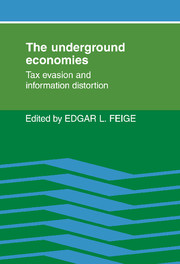Book contents
- Frontmatter
- Contents
- List of contributors
- Preface
- Introduction
- Part I The meaning, measurement, and policy implications of the underground economies
- 1 The meaning and measurement of the underground economy
- 2 Information distortions in social systems: the underground economy and other observer – subject – policymaker feedbacks
- 3 Policy illusion, macroeconomic instability, and the unrecorded economy
- 4 How large (or small) should the underground economy be?
- Part II The underground economy in Western developed nations: measurement in different laboratories
- Part III The underground economy under central planning
- Bibliography
3 - Policy illusion, macroeconomic instability, and the unrecorded economy
Published online by Cambridge University Press: 20 October 2009
- Frontmatter
- Contents
- List of contributors
- Preface
- Introduction
- Part I The meaning, measurement, and policy implications of the underground economies
- 1 The meaning and measurement of the underground economy
- 2 Information distortions in social systems: the underground economy and other observer – subject – policymaker feedbacks
- 3 Policy illusion, macroeconomic instability, and the unrecorded economy
- 4 How large (or small) should the underground economy be?
- Part II The underground economy in Western developed nations: measurement in different laboratories
- Part III The underground economy under central planning
- Bibliography
Summary
During the decade of the 1970's, many Western economies unexpectedly suffered through periods of high unemployment, slowed economic growth, and high rates of inflation. In the 1980's, the major problem has become high interest rates and massive government deficits. The discrepancy between the factual observations of macroeconomic phenomena and the traditional theories that sought to explain them has created disillusion with the economics profession and the perception that macroeconomics in particular is in a state of crisis. Ad hoc modifications of conventional theories and innovative alternative explanations of stagflation and rising deficits have provided economists with a host of doctrinal issues to dispute. However, the absence of any consensus on the underlying causes and cures for these economic maladies has left the economics profession and policymakers in a state of great uncertainty as they confront a deteriorating situation. It is now apparent that the professional optimism that characterized the decade of the 1960's was shattered by the economic record of the 1970's. The prospects for the present decade will depend upon our ability to correctly diagnose what went wrong in the last one.
In the decade of the 1960's, the U.S. economy enjoyed an average rate of inflation of 2.8% combined with an average rate of unemployment of 4.7%, whereas during the 1970's, the economy experienced inflation at 6.6% and unemployment at 6.2%. The enthusiastic profession of the 1960's believed that it was possible to fine tune an economy that was thought to be characterized by a trade-off between inflation and unemployment.
- Type
- Chapter
- Information
- The Underground EconomiesTax Evasion and Information Distortion, pp. 81 - 110Publisher: Cambridge University PressPrint publication year: 1989
- 5
- Cited by



